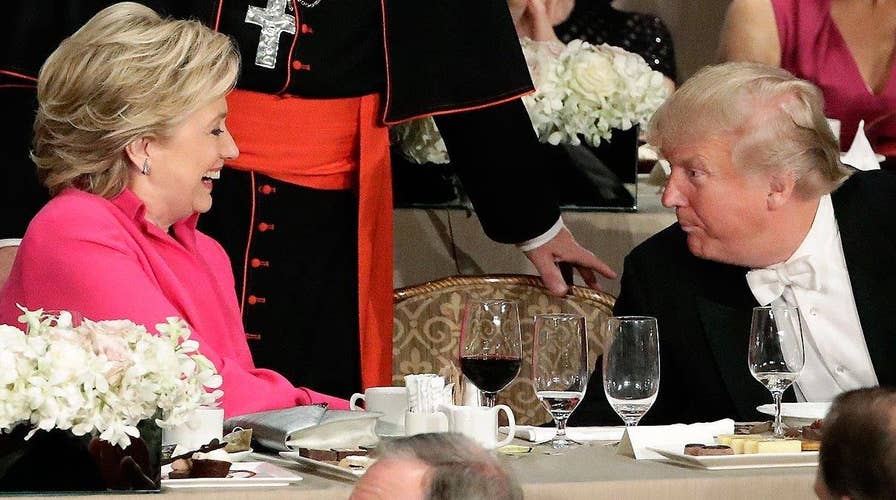Clinton and Trump trade jabs at Al Smith dinner
Reaction on 'The Kelly File' after the candidates go on offense at charity dinner
"Liar." "Lock her up." "Such a nasty woman." "Prison for Hillary." If you have followed this Presidential campaign, you’re familiar with these words and phrases.
In the last few days, President George H.W. Bush’s letter to incoming president William Jefferson Clinton has gotten a little attention. In the letter, Bush 41 wishes his successor a happy time in the White House, cautions him not to be discouraged from pursuing his goals, and commits to Bill that he is now "our" president.
Sounds almost quaint, like something from another century; indeed, it was. Today, candidates think they must resort to hateful rhetoric. Is civility part of a bygone era that we will never see again?
While nastiness and negative campaigns have always been with us, this new cycle of demonizing began in 2009 when President Obama unveiled his Affordable Care Act to a Joint Session of Congress. Congressman Joe Wilson of South Carolina shouted, "You lie!" twice. Many people, on both sides of the aisle, were repulsed. Never had someone, much less a member of Congress, addressed the president of the United States that way. Joe Wilson's outburst is minor league if we compare it to the language of 2016.
We have gone to our respective corners, and the only way we win is to vanquish the other side. The problem is, in that game, nobody wins. Yes, we have our policy differences, but when you add crude and uncivil language to the pot, those policy differences never get resolved because we refuse to talk to each other.
I am currently teaching a course on "campaigns and elections." My millennial students are preparing for their first presidential vote; it is unlikely that they remember more than one previous election. Here's my problem. They think that the language of this campaign is normal! For those of us who have been here awhile, we know it's not.
When all is said and done on November 9, how do we govern? How do we put this back together?
We have gone to our respective corners, and the only way we win is to vanquish the other side. The problem is, in that game, nobody wins. Yes, we have our policy differences, but when you add crude and uncivil language to the pot, those policy differences never get resolved because we refuse to talk to each other.
Senators Ted Kennedy (D-Mass.) and Strom Thurmond (R-S.C.) agreed on nothing when they served together in the Senate. But each would address the other as “my honorable colleague from the great state of_____" It’s antiquated but it speaks to how you get along in order to govern.
People have a right to be mad. Government has failed working-class Americans. And so, it is normal to lash out. But what Trump is doing is manipulative. He knows that coarse and crude language is like catnip to the media.
There is no doubt that both sides have used coarse language, but to equate them is a false equivalency. Parents who are Trump supporters are the ones allowing their children to wear "lock her up" T-shirts and carry signs that say "Trump that b*tch."
Maybe this is the new normal. Maybe baby boomers and others who are chronologically gifted can only look back and say it was different in the "good ole days." Maybe our children will watch ads on television and not recoil the way we do. But is that what we want for our politics and our country?

